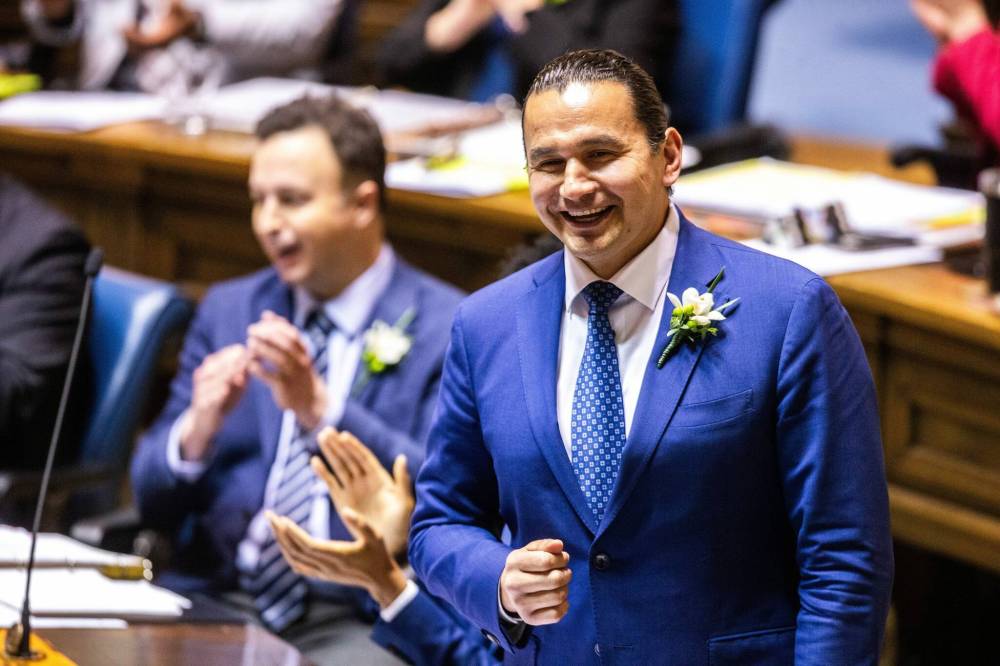Calling it “an obvious step that should’ve been taken long ago,” Manitoba Premier Wab Kinew says his government’s plan to hire 1,000 new health-care workers in a year relies heavily on new graduates in the province accepting positions here.
The plan right now is to issue formal job offers to each student graduating from post-secondary programs in medicine, nursing and paramedic and health-care aide training.
The 1,000-worker target announced in Tuesday’s provincial budget — 210 nurses, 100 doctors, 90 paramedics and 600 aides — is based on the number of students currently getting ready to graduate. Apart from offering them jobs and trying to “change the culture” of health-care work to keep existing staff, the provincial recruitment and retention plan is scant on details.

MIKAELA MACKENZIE / FREE PRESS
Premier Wab Kinew’s plan to hire 1,000 new health-care workers is to issue formal job offers to students graduating from Manitoba post-secondary programs in medicine, nursing and paramedic and health-care aide training.
“We’re going to do something that seems like an obvious step that should’ve been taken long ago,” Kinew said when asked for details Wednesday.
“The minister of health and I, when somebody graduates… we’re going to put a letter of offer for a job in their hands, and we’re going to hire them here on the front lines in Manitoba.”
The premier has promised at least 1,000 workers will be hired this year, and he has said he hopes to “outdo” that target.
Adding 1oo new doctors in one year “is a stretch goal and would be historic,” according to Doctors Manitoba.
“When somebody graduates… we’re going to put a letter of offer for a job in their hands, and we’re going to hire them here on the front lines in Manitoba.”–Wab Kinew
An average of 60 doctors start working in Manitoba every year, factoring in the annual total of about 213 new doctors who start practising and approximately 153 who retire or leave the province, according to a data analysis compiled by the professional organization for physicians in the province.
Adding 100 new physicians is achievable if the province increases the number of new doctors by 10 per cent and reduces departures by 10 per cent, Doctors Manitoba has stated.
The record high for net new doctors in a year was 83 in 2014, the organization’s data shows.
Doctors Manitoba president Dr. Michael Boroditsky said he is optimistic about the goal and hopes to see more work put into streamlining the process for internationally licensed physicians who already live in Manitoba to use their training here, as well as more efforts to recruit from out-of-province.
“Changing culture is not an easy thing, so I will give the present government its due, that they have been listening to what we’re saying,” he said, adding doctors want to be involved in recruitment.
“It’s like any profession. If a colleague of yours speaks highly about what’s going on in the place they work, it’s enticing to consider making that change, so we feel those should be priorities in the short term.”
More teachers are needed to educate additional medical students, and it will likely take more newly practising doctors to fill the gap left by retirements, Boroditsky said.

Mike Deal / FREE PRESS FILES
Dr. Michael Boroditsky, president of Doctors Manitoba.
Many doctors often used to work 60 or more hours a week, he said, but a new generation is demanding better work-life balance.
“People don’t want to work that way anymore, and there’s nothing wrong with that; you shouldn’t have to,” he said. “But the reality is, if you had a doc that had worked 100 hours a week who retires at 70, you need more than one physician to come in and fill that spot.”
The Tories have said an influx of new health-care workers this year is only possible thanks to their previous investments in expanding post-secondary program seats for prospective health professionals.
PC health critic Kathleen Cook said the NDP is going to have a hard time convincing graduating doctors and nurses to stay in the province.
“Cost of living is going up in Manitoba. You can’t attract and retain health-care staff in Manitoba while raising taxes and increasing the cost of housing through property taxes,” said Cook (Roblin) in a statement to the Free Press Wednesday.
“Manitoba needs a tangible plan to attract, train, and retain staff in our health-care system, and be competitive with our western neighbours in Alberta and Saskatchewan, where taxes are lower and they’ll be able to keep more of their wages.”
“Changing culture is not an easy thing, so I will give the present government its due, that they have been listening to what we’re saying.”–Dr. Michael Boroditsky
Contrary to the previous government’s approach, improving working conditions on the front lines will “fix the hole in the bottom of the boat” to prevent medical staff from leaving because of burnout or mandatory overtime, Kinew said.
After offering jobs to new grads, he said the province will look to bring in more internationally educated doctors and nurses, and encourage recently retired nurses to return.
The premier also said Manitoba would offer competitive wages and lean on Manitoba’s lower cost of living to convince doctors they can purchase homes here and get more for their money.
The way to hit those targets means continuing to listen to health-care workers, said Health Minister Uzoma Asagwara, adding retention is “top priority.”
In its first budget, the government promised to establish a provincial recruitment and retention office for health care. No specific dollar figure has been allocated to create the office, and its mandate hasn’t been announced. Kinew said it will be set up this year.
Asagwara said it will “focus on streamlining the efforts to make sure we’re doing what makes sense for Manitobans.”
“That hasn’t happened in our province,” the health minister said. “A concerted, consolidated, focused effort that is bringing people together, organizing everybody and getting results.”
Manitoba Nurses Union president Darlene Jackson said she’s hopeful about a focus on retention.
“The details are really important right now and none of us have any details on that, so we’re all kind of waiting for details on that office,” she said. “How is it going to be staffed, how much money is going to go into it, what is the goal?”
Hiring 210 nurses in a year is “reasonable” based on the number of graduating students, Jackson said, but convincing others not to take early retirement is another concern.
“What worries me more is how many nurses we’re going to lose out of the system to retirement, because I believe that number will probably be more than 210.”
katie.may@freepress.mb.ca
